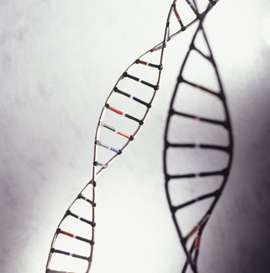Study raises questions about reporting incidental genetic findings

A review of medical records of patients with genetic variations linked with cardiac disorders found that patients often did not have any symptoms or signs of the conditions, questioning the validity of some genetic variations thought to be related to serious disorders, according to a study in the January 5 issue of JAMA.
Sequencing of selected gene sets, whole exomes, and whole genomes is increasingly used for research and clinical care. These approaches also identify incidental findings (also called secondary findings) of potential clinical relevance. Driven by the prospect for preclinical diagnosis and risk factor mitigation, the American College of Medical Genetics and Genomics has supported the return of medically actionable incidental findings and generated a list of genes in which known or predicted pathogenic (pertaining to genetic cause of a disease or condition) variants should be returned to patients who undergo clinical sequencing. These recommendations have been controversial because the frequency of clinical manifestations of these variants and their implications for diagnosis and management are poorly defined. Phenotype (an appearance or characteristic of an individual, which results from the interaction of the person's genetic makeup and his or her environment) data from electronic medical records (EMRs) may provide a resource to assess the clinical relevance of rare variants, according to background information in the article.
Dan M. Roden, M.D., and Sara Van Driest, M.D., Ph.D., of the Vanderbilt University Medical Center, Nashville, Tenn., and colleagues determined the clinical phenotypes from EMRs for individuals with variants designated as pathogenic by expert review in arrhythmia susceptibility genes. The study included 2,022 individuals recruited for nonantiarrhythmic drug exposure phenotypes for the Electronic Medical Records and Genomics Network Pharmacogenomics project from 7 U.S. academic medical centers. Variants in SCN5A and KCNH2, disease genes for long QT and Brugada syndromes (potentially fatal cardiac conditions), were assessed for potential pathogenicity by 3 laboratories and by comparison with the database ClinVar. Relevant phenotypes were determined from EMRs, with data available from 2002 (or earlier for some sites) through September 10, 2014.
Among the 2,022 study participants, a total of 122 rare variants in 2 arrhythmia susceptibility genes were identified in 223 individuals (11 percent of the study cohort). Expert laboratory review of these variants designated 42 as potentially pathogenic, and these classifications were discordant across the laboratories. Review of EMR and electrocardiographic (ECG) data revealed no difference in prevalence of arrhythmia diagnoses or ECG phenotypes among participants with the designated variants compared with those without.
After the researchers performed a manual review of EMR data and an ECG review, the majority of participants with a designated variant in either SCN5A or KCNH2 had no identifiable arrhythmia or ECG phenotype. Among patients with designated variants, 35 percent had evidence of any arrhythmia or ECG phenotype.
The authors write that there are several potential explanations for the paucity of clinical manifestations among participants with these variants, including that some participants may have clinically manifest disease that was not documented in the EMR; these variants may have low penetrance or cause subclinical disease except in the setting of additional genetic or environmental influences; this cohort may not represent individuals at risk for the phenotype; and some of these designated variants may confer little or no increased risk for either arrhythmias or ECG abnormalities.
"Establishing the clinical validity of genetic variations proposed as biomarkers for important health conditions can be technically challenging, time-consuming, and expensive. The success of precision medicine ultimately depends on the availability of biomarkers in which the clinical community has confidence," writes William Gregory Feero, M.D., Ph.D., of Maine Dartmouth Family Medicine Residency, Fairfield, Maine, and Associate Editor, JAMA, in an accompanying editorial.
"The report by Van Driest et al provides a glimpse of a potential future in which EMR data might be used to define the clinical validity of biomarkers, genetic or otherwise, more rapidly, and at potentially lower cost, than is possible via traditional approaches. However, the study also exposes some shortcomings in the existing ability to meaningfully predict the consequences of at least some genetic variations currently thought to be causally related to serious disorders. For now, caution should be exercised when considering clinical interventions informed by the presence of 'pathogenic' variations in healthy individuals, families, and populations."
More information:
JAMA, doi:10.1001/jama.2015.17701
JAMA, doi:10.1001/jama.2015.17702



















